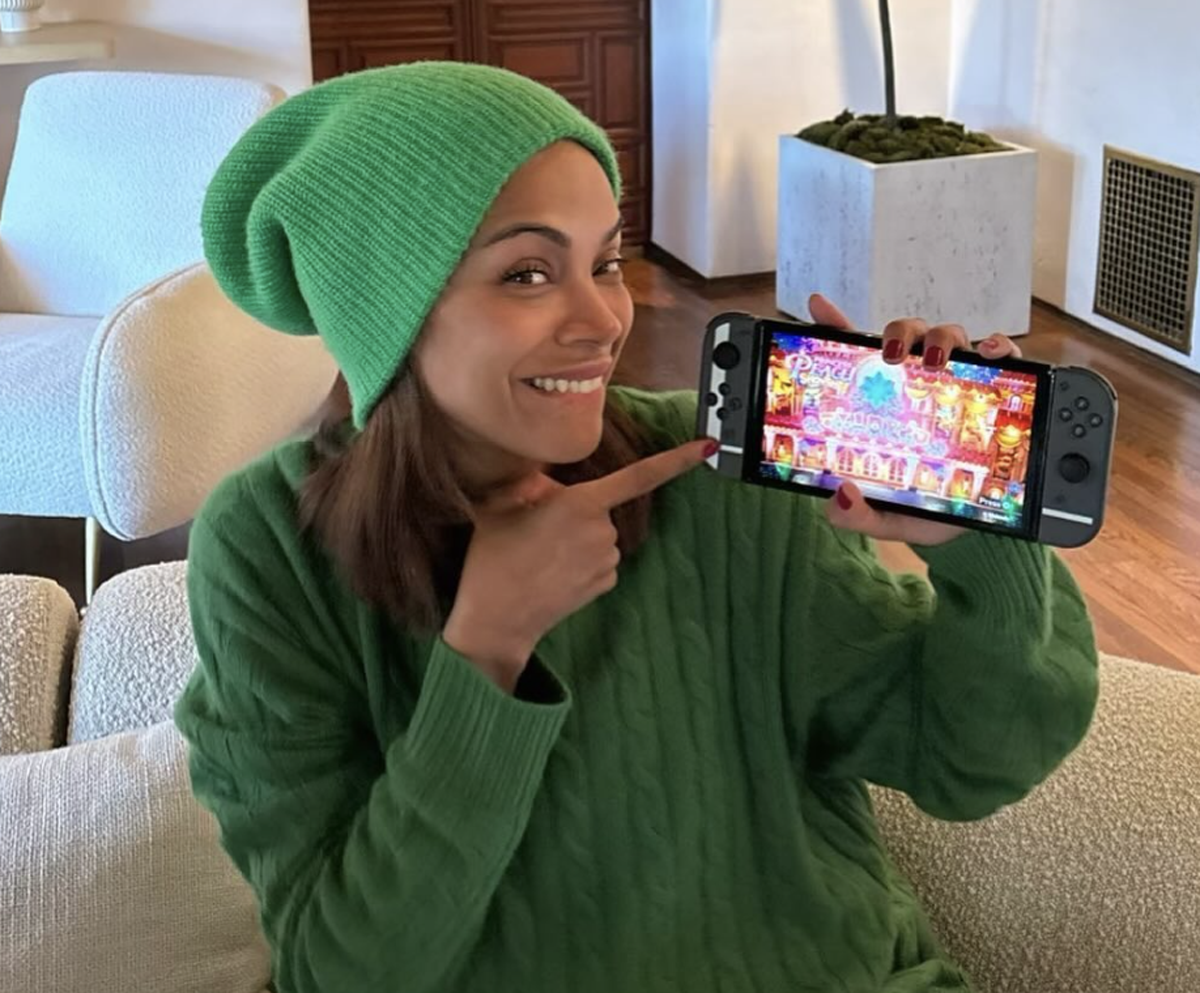Being a mom is hard. Being a mom trying to raise a son who can overcome toxic masculinity is harder. If you ask movie star Zoe Saldana, she’ll remind you that “for many centuries, the domestic role for a woman was never even acknowledged as labor. When, in reality, it is the most important role in a family household.”
As two moms raising boys, Ms. Saldana and I spent some time chatting about inhabiting characters, gaming with our kids, and finding ways to raise the next—and hopefully better—generation of men.
Choose Your Avatar!
Inhabiting a fictional character as an actress means understanding a perspective different from your own, including how the person would think and their motivations. Saldana explained:
I have always been a people watcher. I’ve always been curious about how you can give an event to 50 people, and they will have 50 different reactions about the same event. It has a lot to say about how diverse and complex human behavior is.
As a storyteller, Saldana notes that as an artist the fun lies in “playing characters that allow me to be an avatar, no pun intended.”
The mention of the avatar turned the conversation to gaming—and playing Nintendo games with her children. After all, making a Mii or customizing a character is one of the most creative (and sometimes time-consuming) parts of gaming.
In recounting her children’s experience, she shared:
They spent a great deal of time putting together their avatars, and then they change it. Then they change this or they change that, so it means a lot to people.
These digital representations of ourselves allow us to inhabit the worlds of our games, much like an actress inhabits the characters in her performances.
Teach Your Children Well (With Princess Peach: Showtime!)
As a parent, teaching my child to be a better person than I am is a primary goal, and the Crosby, Stills, Nash, and Young song “Teach Your Children” is on regular repeat in my brain radio. When feeding my son on my dreams, I often look to the man I hope he becomes, someone who seeks to champion equality and work to make the world a better place.
Video games can help parents do this. Research has found that video games with a positive message can create empathy in players. Specifically, games with storylines focused on helping others stimulate empathy, especially when players feel more immersed or involved in the game. Nintendo’s games align with its corporate belief in social responsibility and its mission statement, “to create smiles through unique entertainment experiences.” Anyone who’s ever played a Nintendo game will tell you that the storylines often focus on values like kindness, helping others, and friendship.
For the Gen X/Xennial/Millennials, Nintendo brings a sense of nostalgia, a reminder of our childhoods and the lessons we learned through the games. Like many of us, Saldana chose a first gaming system for her kids and explained:
I’m just happy that Nintendo is the brand that we decided and we curated to allow them to sort of start with, and it came coincidentally right around the time when I was asked to join on this partnership, so that’s why I wanted to be genuine about it.
They want to play these games that they know that my husband and I played when we were little. I’m happy that I get to share an experience that meant so much to me growing up, and now they’re doing it.
The joy children have from playing these games and the ways they bring families together give parents the opportunity to have difficult conversations in age-appropriate ways. When our sons value women, we can move past the historical ties that have bound us for so long. Saldana explained that her favorite iteration of Princess Peach in the new game Princess Peach: Showtime! is the ninja because:
I was a ninja every Halloween when I was a little girl. I was the only little girl that was the ninja. I didn’t want to be just with the boys. I wanted to be with the girls but they were princesses and queens. When you get together with all the kids on the block and they don’t see your face, they think you’re one of the boys.
While women like us can inhabit these characters that were out of the norm for us as children, boys can also experience identities that may be considered outside of the norm for them. Recognizing this experience, Saldana noted:
Our children, they remind us a lot about when we were young, when we were little, and their fear of being singled out by their peers is just—it’s everything. Sometimes, it is life-consuming for them.
With video games, our children can explore different identities, like little boys playing the figure skating Princess Peach to see that being a figure skater may seem like a “girl” activity but is still ok for any of us.
Games, like Princess Peach: Showtime!, give us—and our kids—the gift of empathy. For moms raising sons, Princess Peach: Showtime! opens the door to discuss gender inequality and toxic masculinity without feeling overwhelming. Ms. Saldana summed up this gift perfectly:
I think that in order for us to empower women, I think we have to play them. We have to be in their shoes. We have to understand what they mean when they say that’s unfair towards me, that’s discrimination against me.
It’s great because when you’re saying these things, they’re kind of like rolling their eyes or their thoughts leave the building, but then when you hear them repeat the same things that you have been saying to them verbatim to their peers, then it is the most encouraging thing.
I’m happy that for 20 minutes my three little boys woke up talking about nothing other than a girl and celebrating it as strong.



